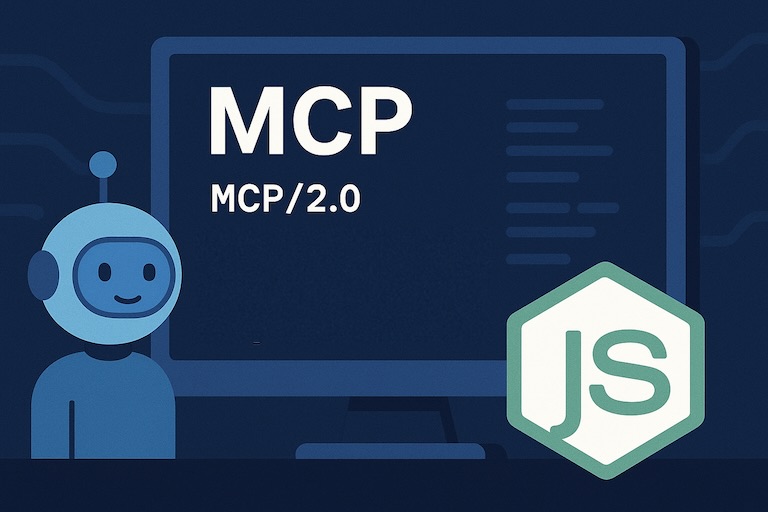Create Your First MCP Server with Node.js
The Model Context Protocol (MCP) provides a standardized way for AI assistants to interact with external tools and services. In this blog, we’ll explore how to create a simple MCP server using Node.js that implements arithmetic operations. This server will allow AI models to perform basic calculations like addition, subtraction, multiplication, and division through a clean interface.
Why Use the Model Context Protocol?
MCP offers several advantages for connecting AI models with external tools:
- Standardized Communication: Provides a consistent way for AI models to interact with external services.
- Tool Discovery: AI assistants can dynamically discover available tools and their capabilities.
- Security: Clear boundaries between AI models and external systems with explicit permissions.
- Flexibility: Easy to extend with new capabilities while maintaining backward compatibility.
- Human-in-the-loop Options: Allows for human oversight of tool usage when needed.
Getting Started with MCP
Prerequisites
To follow along, ensure you have the following:
- Node.js (v18 or newer)
- Basic understanding of Javascript
- An MCP-compatible client (such as Claude Desktop)
Choosing the Right Module
For our implementation, we’ll use the official @modelcontextprotocol/sdk package. This package provides a robust and up-to-date implementation of the MCP specification. After evaluating alternatives, this SDK is preferred because:
- It’s officially maintained and aligned with the MCP specification
- It provides both stdio and HTTP-based transports
- It offers helper utilities that simplify server implementation
Install the required packages:
mkdir arithmetic-mcp-server
cd arithmetic-mcp-server
npm init -y
npm install @modelcontextprotocol/sdk zod
Creating Your First MCP Server
Let’s implement a simple MCP server that provides arithmetic operations. Create a new file called server.js and start with the server setup:
import { McpServer } from "@modelcontextprotocol/sdk/server/mcp.js";
import { StdioServerTransport } from "@modelcontextprotocol/sdk/server/stdio.js";
import { z } from "zod";
// Create an MCP server
const server = new McpServer({
name: "arithmetic-server",
version: "1.0.0",
capabilities: {
tools: {} // Enable tools capability
}
});
Now, let’s implement each tool. First, the addition tool:
This tool takes two numeric inputs and returns their sum, providing a simple way for AI models to perform addition calculations.
server.tool(
"addition",
"Add two numbers together",
{
a: z.number().describe("First number"),
b: z.number().describe("Second number")
},
async ({ a, b }) => {
console.error(`Performing addition: ${a} + ${b}`);
const result = a + b;
return {
content: [{ type: "text", text: `${result}` }]
};
}
);
The subtraction tool allows AI models to find the difference between two numbers.
server.tool(
"subtraction",
"Subtract second number from first number",
{
a: z.number().describe("First number"),
b: z.number().describe("Second number")
},
async ({ a, b }) => {
console.error(`Performing subtraction: ${a} - ${b}`);
const result = a - b;
return {
content: [{ type: "text", text: `${result}` }]
};
}
);
This tool handles multiplication operations, returning the product of two numbers.
server.tool(
"multiplication",
"Multiply two numbers together",
{
a: z.number().describe("First number"),
b: z.number().describe("Second number")
},
async ({ a, b }) => {
console.error(`Performing multiplication: ${a} * ${b}`);
const result = a * b;
return {
content: [{ type: "text", text: `${result}` }]
};
}
);
The division tool includes error handling for division by zero, demonstrating how to properly handle edge cases in MCP tools.
server.tool(
"division",
"Divide first number by second number",
{
a: z.number().describe("First number (dividend)"),
b: z.number().describe("Second number (divisor)")
},
async ({ a, b }) => {
console.error(`Performing division: ${a} / ${b}`);
if (b === 0) {
return {
content: [{ type: "text", text: "Error: Cannot divide by zero" }],
isError: true
};
}
const result = a / b;
return {
content: [{ type: "text", text: `${result}` }]
};
}
);
Text Reversal Tool
Beyond arithmetic, this tool demonstrates how MCP can handle string manipulation. It offers two modes: full string reversal and word-by-word reversal, showing how optional parameters can enhance tool flexibility.
server.tool(
"reverse-text",
"Reverse the characters in a word or sentence",
{
text: z.string().describe("Text to reverse"),
reverseWords: z
.boolean()
.optional()
.describe("If true, reverse each word individually but keep word order")
},
async ({ text, reverseWords = false }) => {
console.error(`Reversing text: "${text}" (reverseWords: ${reverseWords})`);
let result;
if (reverseWords) {
// Reverse each word individually but maintain word order
result = text
.split(" ")
.map((word) => word.split("").reverse().join(""))
.join(" ");
} else {
// Reverse the entire string
result = text.split("").reverse().join("");
}
return {
content: [{ type: "text", text: result }]
};
}
);
Finally, let’s connect the server to the stdio transport and start it:
// Connect to stdio transport
// Note: Avoid using console.log() since it interferes with the stdio transport
// Use console.error() for debugging output since it writes to stderr instead of stdout
async function main() {
console.error("Starting arithmetic MCP server...");
const transport = new StdioServerTransport();
await server.connect(transport);
console.error("Arithmetic MCP server running");
}
main().catch((err) => {
console.error("Server error:", err);
process.exit(1);
});
Make sure to modify your package.json to include:
{
"type": "module"
}
To test if everything is working fine run:
node server.js
Connecting to an MCP Client
To use your MCP server with Claude Desktop or another MCP client, you’ll need to configure the client to recognize your server. For Claude Desktop, add an entry to the configuration file located at:
- macOS:
~/Library/Application\ Support/Claude/claude_desktop_config.json
- Windows:
%APPDATA%\Claude\claude_desktop_config.json
Here’s a sample configuration:
{
"mcpServers": {
"arithmetic": {
"command": "node",
"args": ["/absolute/path/to/your/server.js"]
}
}
}
After restarting Claude Desktop, you’ll be able to use your arithmetic server in conversations.
Testing Your MCP Server
Once your server is connected to Claude client, you can test it with arithmetic problems.
Before testing, make sure your MCP server is properly connected to Claude by going to “Claude -> Settings -> Developer -> arithmetic” in the Claude desktop app. You should see your arithmetic server listed with a running status.
Try asking Claude this question to test multiple tools in sequence:
Adam has 448 apples. He gives three apples to Steve. Then he receives an additional 221 apples from Ana. Finally, he divides all remaining apples equally among the three baskets. How many apples does Adam place in each basket? use tool
This demonstrates how AI assistants can use your MCP server to perform calculations without having to implement the arithmetic logic themselves.
Key Features
Our server uses Zod for schema validation, ensuring that:
- Input parameters are properly typed
- Required parameters are provided
- Values meet specified constraints
This helps prevent runtime errors and improves the reliability of our tools.
Error Handling
Our division tool includes error handling to address division by zero:
server.tool(
"division",
"Divide first number by second number",
{
a: z.number().describe("First number (dividend)"),
b: z.number().describe("Second number (divisor)")
},
async ({ a, b }) => {
console.error(`Performing division: ${a} / ${b}`);
if (b === 0) {
return {
content: [{ type: "text", text: "Error: Cannot divide by zero" }],
isError: true
};
}
const result = a / b;
return {
content: [{ type: "text", text: `${result}` }]
};
}
);
By setting isError: true, we notify the client that an error occurred during tool execution.
Logging
Our implementation includes logging to help with debugging:
console.error(`Performing addition: ${a} + ${b}`);
This can be particularly useful when troubleshooting issues with tool execution.
Best Practices for MCP Server Development
When developing your own MCP servers, keep these best practices in mind:
- Input Validation: Always validate inputs thoroughly to prevent errors and security issues.
- Error Handling: Implement proper error handling with informative messages.
- Security: Be cautious about the operations your tools perform, especially when evaluating user-provided expressions.
- Documentation: Provide clear descriptions for your tools and their parameters.
- Testing: Test your server with multiple clients to ensure compatibility.
- Monitoring: Add logging to track tool usage and performance.
Conclusion
Building an MCP server with Node.js is straightforward and opens up many possibilities for extending AI assistants with custom capabilities. In this tutorial, we explored how to create a basic arithmetic calculator server using the Model Context Protocol, which can be integrated with MCP-compatible AI assistants.
The Model Context Protocol provides a standardized way for AI assistants to discover and interact with external tools, making it easier for developers to extend AI capabilities without modifying the underlying models. As the MCP ecosystem grows, we can expect to see more sophisticated tools and integrations that enhance the capabilities of AI assistants.
Start building your own MCP servers today and explore the possibilities of AI-tool integration!


